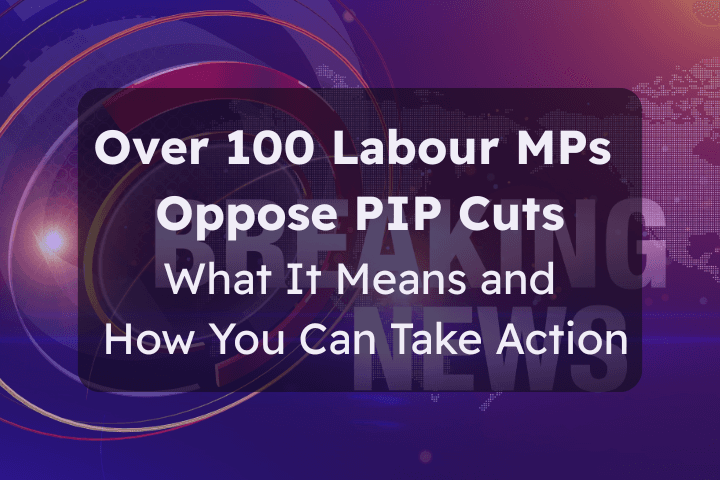All Articles
3 min read
Over 100 Labour MPs Oppose PIP Cuts: What It Means and How You Can Take Action
Written by
Purpl
Published on
June 24, 2025

As of 24 June 2025, more than 100 Labour MPs have publicly come out against the government’s proposed £5 billion cuts to welfare – with a particular focus on opposing changes to Personal Independence Payment (PIP).
These proposed changes could severely impact disabled people, neurodivergent individuals, and those living with long-term mental or physical health conditions.
Although a full official list of all dissenting MPs isn’t available, many have made their opposition clear through public statements, joint letters, and protest action.
What Are the Proposed PIP Changes?
The government is planning to cut £5 billion from the welfare budget. This includes major reforms to how PIP works. Proposals being discussed include:
- Replacing regular cash payments with vouchers or one-off grants
- Introducing stricter eligibility criteria and assessments
- Potentially limiting support for people whose primary need relates to mental health
These changes would make it much harder for disabled people to access the support they need – and could remove financial independence and dignity from thousands.
Which Labour MPs Are Speaking Out?
Despite being the party in government, more than 100 Labour MPs have already taken a stand against these plans.
Some of the MPs who have spoken up include:
- Dame Meg Hillier (Hackney South and Shoreditch) – Chair of the Liaison Committee
- Florence Eshalomi (Vauxhall and Camberwell Green) – Chair of the Housing, Communities and Local Government Committee
- Ruth Cadbury (Brentford and Isleworth) – Chair of the Transport Committee
- Vicky Foxcroft (Lewisham North) – Former government whip who resigned in protest
- Diane Abbott (Hackney North and Stoke Newington)
- Richard Burgon (Leeds East)
- Ian Byrne (Liverpool West Derby)
- Stella Creasy (Walthamstow)
- Clive Lewis (Norwich South)
- Rachael Maskell (York Central)
- Nadia Whittome (Nottingham East)
- Paula Barker (Liverpool Wavertree)
- Lee Barron (Corby and East Northamptonshire)
- Lorraine Beavers (Blackpool North and Fleetwood)
- Olivia Blake (Sheffield Hallam)
- Neil Duncan-Jordan (Poole)
- Cat Eccles (Stourbridge)
- Lauren Edwards (Rochester and Strood)
- Barry Gardiner (Brent West)
- Mary Glindon (Newcastle-upon-East and Wallsend)
- Sarah Hall (Warrington South)
- Chris Hinchliff (North East Hertfordshire)
- Alison Hume (Scarborough and Whitby)
- Imran Hussain (Bradford East)
- Kim Johnson (Liverpool Riverside)
- Mary Kelly Foy (City of Durham)
- Peter Lamb (Crawley)
- Ian Lavery (Blyth and Ashington)
- Brian Leishman (Alloa and Grangemouth)
- Emma Lewell (South Shields)
- Rebecca Long-Bailey (Salford)
- Andy McDonald (Middlesbrough and Thornaby East)
- Abtisam Mohamed (Sheffield Central)
- Navendu Mishra (Stockport)
- Grahame Morris (Easington)
- Connor Naismith (Crewe and Nantwich)
- Simon Opher (Stroud)
- Kate Osborne (Jarrow and Gateshead East)
- Richard Quigley (Isle of Wight West)
- Andrew Ranger (Wrexham)
- Bell Ribeiro-Addy (Clapham and Brixton Hill)
- Jon Trickett (Normanton and Hemsworth)
- Chris Webb (Blackpool South)
- Steve Witherden (Montgomeryshire and Glyndwr)
Additionally, MPs Apsana Begum, John McDonnell, and Zarah Sultana, who are currently suspended from the Labour Party, have also indicated their opposition to the welfare reforms. Many others have signed letters or raised concerns in Parliament. The pressure on the government is growing – and it needs to keep growing.
Why This Matters
Disabled people already face significantly higher daily living costs – often over £1,000 more per month than non-disabled people.
PIP is meant to help cover essential extra costs like mobility aids, transport, care, medication, specialist food, and accessible housing needs.
Cutting or restricting PIP doesn’t save money – it pushes people into deeper poverty, isolation, crisis, and hardship.
This is not just about politics. It’s about rights, safety, and survival.
There’s Still Time to Make Your Voice Heard
The proposed changes have not yet been finalised. You still have the power to influence your MP and call for a fairer, more supportive system.
Here’s how you can help:
- Use our free template letter to contact your MP
- Find your MP’s contact details via TheyWorkForYou
- Personalise your message if you can – share how these cuts could affect you or someone close to you
- Urge them to stand with the growing number of MPs saying no to PIP cuts
Download Our Free Template Letter
Click here to access the copy-paste template letter
You can use it as it is or edit it with your own words and experiences. The more personal, the more powerful – but every message matters.
We’ve stopped harmful reforms before. With enough pressure, we can do it again.
Disabled people deserve support, not cuts.

Sammi is autistic, has ADHD, and lives with POTS. She’s passionate about disability advocacy, accessibility, and creating spaces where people feel seen, heard, and understood. With a sharp sense of humour and a deep love for community, she speaks openly about the realities of being neurodivergent across all of her personal platforms, always aiming to challenge stigma, spark conversations, and remind others they’re not alone.
Other articles you might like:
How to Contact Your MP to Stop The PIP Cuts
PIP Reform 101: Latest Update on Personal Independence Payment (PIP) Changes
What the UK Spending Review Means for Disabled People in the UK
